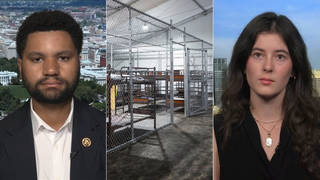Brazilian lawmakers have approved a law making it harder for Indigenous communities to make claims over ancestral territory. The law, which overrides a veto by President Luiz Inácio Lula da Silva, says such claims are not valid unless Indigenous groups physically occupied the land when the 1988 Brazilian Constitution was signed. Many Indigenous communities were expelled from their lands over the course of decades, including during the military dictatorship. The measure comes in the wake of a September Supreme Court ruling which rejected the 1988 timeline for Indigenous territorial claims. The new law, backed by powerful agribusiness interests, threatens to open vast portions of Indigenous territory to logging, mining, farming and ranching. Congressmember Célia Xakriabá was among the minority of lawmakers who voted against the legislation.
Célia Xakriabá: “The defeat is not only for us, the Indigenous people. The defeat is for the climate agenda. We, the Indigenous people, have been the number one solution to stop the climate crisis. And today the Congress responded, throwing the solution away.”
Brazil’s Supreme Court is expected to now review whether the new law is constitutional.











